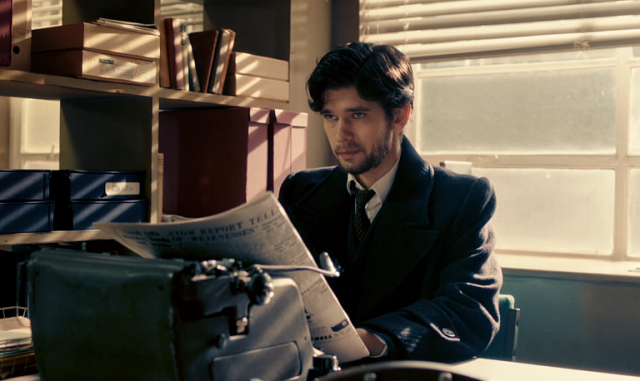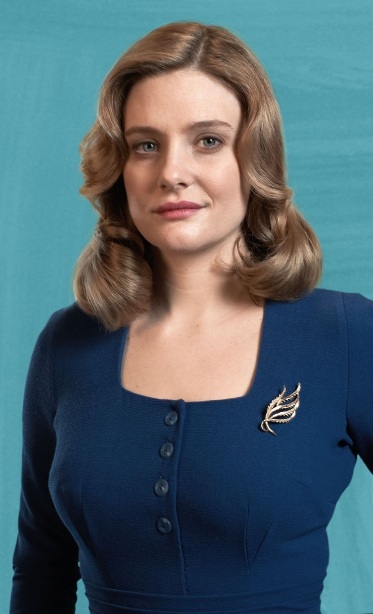After a brilliant start that led to rave reviews (reviews that, if you don’t mind me saying, we’d love to find under here, in the comment section, open for discussion, although we are quite fond of your private messages and other impromptu library discussions) this might feel like a bit of a let down. We haven’t forgotten you or the blog! Both of us have actually engaged in deep reflections on complex topics and thus have exciting but massively elaborate posts in the pipeline.
In the meantime, I watched telly.
The Hour is back! Maybe it was because it was announced the same day Barack Obama was re-elected, but I barely could contain my excitement. There are many reasons why you should feel this way too (one of them is that in the first episode, Ben Whishaw is sporting a very seasonal beard) but for the purpose of this post I will try to stay topical.
Amongst the messages I’ve received relating to this blog, one from my friend Jess was objecting to its self-announced purpose under the following terms:
“I don’t know what it is specifically, but I find the idea that women in general need to wonder what being a woman means a bit annoying. Like, self analysis is great, but starting to examine yourself based on your gender and to even bother defining terms that you think are feminine and not feminine is silly.”
This is a debatable opinion (and a very good example of why you should use the comment box) but an interesting one. I guess what she wants to say is that being a woman is such a part of you that it is not relevant to define it even further (and why bother creating a blog about it?) “By nature of being a woman” she added “everything you do is feminine.”
This is particularly relevant to the difference of treatment of gender dynamics between The Hour and another historical TV show it has been compared to (mostly because of their stunning art direction), Mad Men. The comparison is, in my opinion, less relevant than it seems, as the narrative of the two shows are very different (Mad Men is the chronicle of an era through the identity quest of its main character, The Hour is a historical suspense drama). However, both these shows are set in a particular era and in well-connected milieus (advertising and media) and as such are expected to reflect on the time’s social and political mindset. Mad Men features extensive story lines about women’s struggles (in fact, if it weren’t for Don Draper, this would primarily be the story of a young naive but determined catholic girl professional ascension, or else the tragedy of a perfectly WASP and suburban Madame Bovary) in a way that Jess, if she doesn’t mind me extrapolating, might feel revolve too much about the fact that they are women. The Hour does it very differently. None of the story lines in the first episode of this new season are this conditioned by the gender of its protagonists despite the fact that the main character is a woman. Bel Crowley takes all her strength and independence just by being who she is (the head producer of a prime time news show in 1957) without her gender ever entering into consideration. In fact the brilliant first scene (a countdown to the show going live on air) reverses an expected paradigm as she is nervously waiting for her star presenter to show up, and when he does, he smiles to the camera and reads news that he is obviously presented with for the first time. She is the journalist, he is the diva. She is the brain, he is the pretty face.
I think one of the great strengths of the writing of the show is that this dichotomy is not made explicit, this is just the state of things presented to us. Whether Bel is an exceptional case or the rule, is not elaborated on, she just is in this place she rightly feels entitled to and that is fine. By putting it here in the show, rather than explicitly showing her having to fight her way up to her place, Abi Morgan is effectively telling us “this is where she should be, deal with it” and that might be even more powerful than Peggy Orson’s hardly fought position in Sterling Cooper. She is not there despite or because she is a woman. She is just a woman, and she is there.
Bel, and indeed all women on the show, even the ones cast in more traditional roles (Hector’s lonely wife, the club prostitute), are not telling exemplary tales of struggling femininity, they are telling their own personal stories and their struggles, as bound as they are to their social conditions, are ultimately their own. They are not assessing themselves as women, but as complicated, confused and ultimately diverse human beings.
Maybe Jess is right and it is what being a woman should be about and where Mad Men is often saying “those are the stories of ‘being a woman in America in the 1960’s'”, The Hour is right to subtly reply “these are people, some of them women, and here are their stories.”
Oh and in this episode, brilliant and gorgeous Romola Garai does not get the boys either, despite trying twice, which, as you know, resonates so much with me too.
As representing women goes, one show at least has caused much discussion this fall, dragging even Caitlin Moran into tweeting a rather harsh and controversial statement. (see first paragraph for the story, next ones for its analysis) Girls written by and featuring Lena Dunham was reaching 50 Shades proportions of fame before I even got to know what it was about. I must admit the mix of hype and controversy did not particularly appeal to me but when it was screened at a film and series festival in Geneva and that even my local paper featured a double page about it, I feared that I would encounter one of these many scenarios where I catch the train way too late and I watched it. To be honest, for all that the infamous Moran’s comment and the ensuing controversy sparked of thoughts in me I do not feel that these reflections are matured enough for me to engage in a whole post on feminism, representations and intersectionality. Yet, I understand the importance of all these questions. Should these important issues apply to Lena Dunham’s Girls as well or in priority? For the moment I simply don’t know and will leave it to that.
There is no doubt that Girls is a charming show. It’s sweet, quirky, and in my case, hits extremely close to home. And yes, it does present female characters and way of life that are more realistic than say, Sex in the city (which is winked at during this episode as well). But despite how refreshing it can be to watch a main character that is not physically perfect having awkward sex (in a way that is not played for laughs that is), I don’t feel it has blown my mind in terms of female representations, or even narration yet. Let’s say that I was pleasantly entertained during the whole 30 minutes where the lives of a group of New Yorker graduates and their sex, love and professional lives unfolded in front of me, which, for a first episode, is perfectly fine if not life changing. Ultimately, if things go by my own standards, I think being heralded that much and that early as emblematic of a “new feminist revolution” can only do harm to a show that is genuinely trying to be honest in its treatment of women. And if it does it well in an endearing and entertaining fashion, the new Deuxième sexe it ain’t. The only thing I can take back to my life from this first episode is that if I have to be a twenty-something literature graduate stuck in an underpaid publishing internship, surrounded by friends that are either cooler or more successful than me, having the occasional awkward casual sex encounter (one of these does not apply) and having yet to figure how to become who I am, I’d much rather do it in Brooklyn than Geneva. Alas.
Sarah




But in Brooklyn you wouldn’t have us! D:
(Also, hey, have I ever met your friend Rachel? She seems nice.)
In my wild dreams we’re all living marginally cooler lives together in a fictional version of Brooklyn 😀 (Nope, we actually ‘became friends’ after you visited and she is).
Sarah